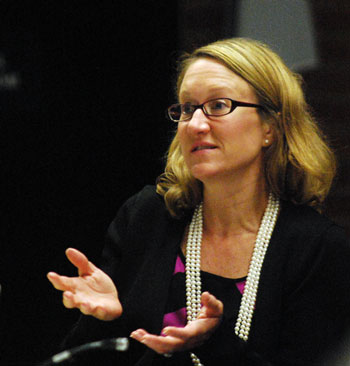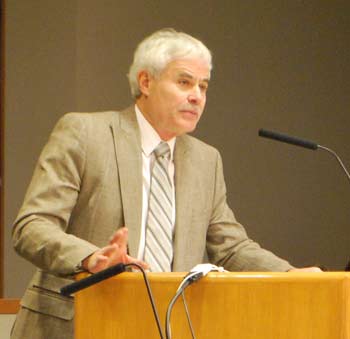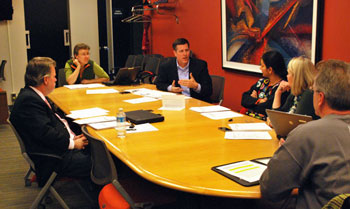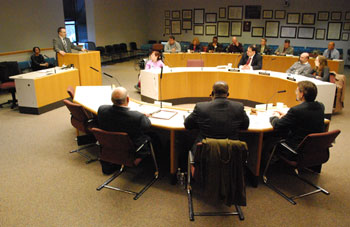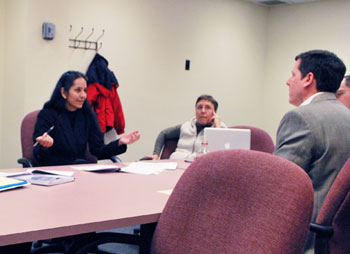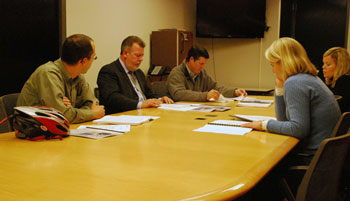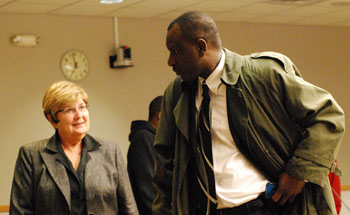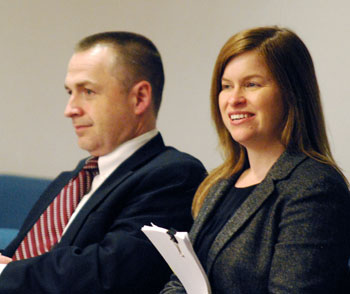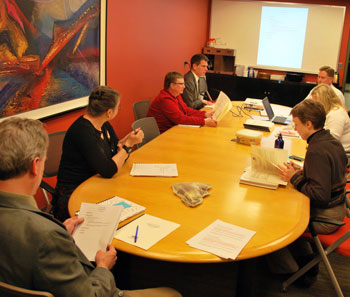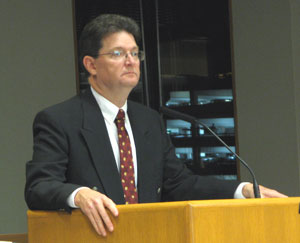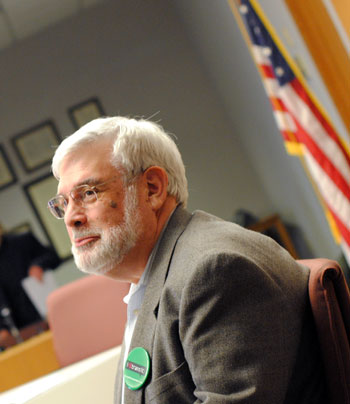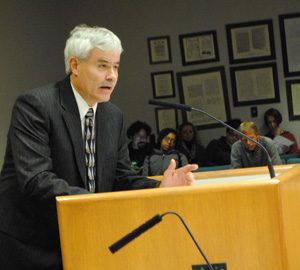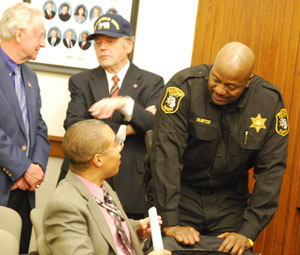Ann Arbor LDFA Looks to Extend Its Life
Ann Arbor Local Development Finance Authority board meeting (June 17, 2014): The LDFA board’s meeting convened around 8:20 a.m. – about seven hours after the city council’s meeting adjourned the previous evening. And the council’s meeting was the topic of small talk among LDFA board members as they waited for their meeting to convene.
The council’s meeting was of more than just passing interest to the LDFA board members – because the council voted at that meeting to table a $75,000 contract for business development services with Ann Arbor SPARK, a local nonprofit economic development agency. Ann Arbor SPARK is also the LDFA’s contractor – but not for the same kind of services that SPARK delivers under its contract with the city. The council will likely take up its contract with SPARK again at a future meeting, possibly as soon as July 7.
The city’s annual contract with SPARK, which is paid for with general fund money, is meant to cover the attraction and retention of mature companies to the Ann Arbor area. In contrast, the LDFA contracts with SPARK for entrepreneurial support services – for companies that are in some phase of starting up.
On the LDFA board’s June 17 agenda was the annual contract with Ann Arbor SPARK for entrepreneurial support services – which the board voted to approve. This year that contract is worth nearly $2 million – $1,891,000 to be exact.
An unsuccessful bid by councilmembers made during the city’s FY 2015 budget deliberations would have reduced the total LDFA expenditures by $165,379. The goal of that expenditure reduction would have been to increase the fund balance that was available for infrastructure improvements in the LDFA district – specifically, for high-speed telecommunications. At the LDFA’s June 17 meeting, city CFO Tom Crawford indicated that sometime in the FY 2015 fiscal year, the city would be making a proposal to install fiber throughout Ann Arbor.
The contract between the LDFA and SPARK covers a range of items, with the top two line items consisting of staffing for the business incubator ($420,000) and provision of services to start-up companies in Phase III of their development ($550,000). SPARK classifies its engagement with companies in terms of phases: preliminary screenings (Phase I); due diligence (Phase II); intensive advising (Phase III); and accelerating opportunities (Phase IV). [.pdf of FY 2015 budget line items] [.pdf of LDFA-SPARK FY 2015 contract]
At its June 17 meeting, the LDFA board also approved a routine annual $42,600 contract with the city of Ann Arbor – for administrative support services. Those include items like the preparation of meeting minutes, stewardship of public documents, and preparation of budgetary analyses. [.pdf of FY 2015 LDFA contract with city of Ann Arbor]
The final voting item for the board was approval of its meeting schedule for the next fiscal year. The LDFA board meets in eight out of 12 months, with the next meeting taking place on July 15, 2014, starting at 8:15 a.m. in the city council chambers. [.pdf of 2014-2015 meeting schedule]
These voting items did not, however, generate the majority of the board’s discussion at its June 17 meeting.
The board focused most of its discussion on issues surrounding its application for an extension of the LDFA past its current 15-year lifespan, which ends in 2018. Legislation passed in 2012 allowed for either a 5-year or a 15-year extension – with different criteria for those time periods. The 15-year extension requires an agreement with a satellite LDFA, with two communities currently under consideration to partner with Ann Arbor’s LDFA: Brighton and Adrian. Flint had also been a possibility, but is no longer on the table.
With an extension, the LDFA would continue to capture school operating millage money, which would otherwise go to the state’s School Aid Fund. At least some of the school taxes subject to capture by LDFAs statewide are required to be reimbursed to the School Aid Fund by the state. Questions about how that applies to Ann Arbor’s LDFA have been raised – and a review of the state statute appears to support the conclusion that the key clause requiring reimbursement is inapplicable to the Ann Arbor SmartZone LDFA. That understanding was confirmed to The Chronicle by the Michigan Dept. of Treasury communications staff in a telephone interview on June 23.
The exact nature of that tax capture arrangement and possible reimbursement was also the subject of LDFA board discussion on June 17 – because the LDFA board is being pressed by city councilmembers to account for how the LDFA tax capture impacts the state’s School Aid Fund. Board member Stephen Rapundalo expressed some frustration about that – based on his perception that this material had been well explained in the past: “What’s it take – for them to understand unambiguously how that works? I mean, we have told them. Why is the onus on the LDFA to have to show them that?”
Besides the tax capture mechanism, two other issues raised by city councilmembers are factoring into the LDFA board’s approach to seeking an extension of its term. Board chair Carrie Leahy told her colleagues that she took away two main messages from recent appearances in front of the Ann Arbor city council. Some councilmembers, she said, would like to see: (1) an independent audit of job creation numbers; and (2) a provision for infrastructure investments as part of an LDFA extension.
On the infrastructure side, the LDFA board’s discussion focused on the existing TIF (tax increment finance)/development plan, which provides for investments in high-speed telecommunications (fiber) networks, but not for projects like street construction, sewer construction and streetlight installation. The question was raised as to whether the LDFA could use its school tax capture to pay for a fiber network in the whole geographic district of the LDFA – or if school taxes could only be used to fund a fiber network to an business incubator.
The Ann Arbor LDFA’s district covers the geographic areas of the Ann Arbor and Ypsilanti downtown development authorities – although Ypsilanti’s DDA area does not generate any LDFA tax capture. As a consequence, money captured by the LDFA is not spent in the Ypsilanti portion of the district. But that could change under an extension of the LDFA – based on board discussion at the June 17 meeting.
On the job creation numbers audit, the June 17 board discussion indicated that the LDFA will now be looking possibly to incorporate a job numbers audit as part of an upcoming financial audit. The financial auditing firm will be asked to provide some explanation of how it might be able to incorporate a jobs audit as part of its scope of work for the upcoming financial audit. The board appears to understand that some type of jobs audit would be important for winning ultimate city council support for a 15-year extension of the LDFA.
The city council’s representative to the LDFA board, Sally Petersen, made that explicit more than once during the June 17 meeting, saying that “taking the lead on establishing an independent audit would go a long way towards getting city council support for an extension.”
The LDFA’s deliberations and other agenda items are reported in more detail below. [Full Story]




